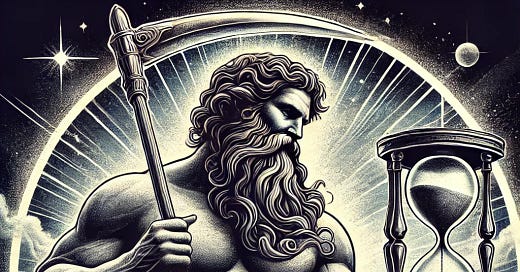Saturn, one of astrology's most powerful and enigmatic planets, often carries a bad reputation. Associated with restriction, delay, hardship, and limitation, it’s no wonder Saturn is sometimes seen as a planet to be feared rather than embraced. However, like any cosmic force, Saturn’s influence is complex, and its positive aspects are often overlooked. In this article, we’ll explore how Saturn got its bad reputation, highlight its gifts, and delve into its historical worship, particularly during the Roman festival of Saturnalia.
How Saturn Got Its Bad Reputation
In astrology, Saturn is known as the "Great Malefic," a term derived from ancient traditions where certain planets were thought to bring challenges and hardships. As the ruler of time, karma, and boundaries, Saturn demands discipline and structure. It governs life's inevitable lessons, such as aging, responsibility, and the consequences of our actions.
Saturn’s influence is often felt during challenging times, like the notorious Saturn return, a period that occurs every 29-30 years when Saturn returns to the place it occupied at the time of your birth. During this time, people tend to face a reckoning of sorts—whether in relationships, career, or personal growth. For many, this can feel like a period of restriction, loss, or forced maturity, which has contributed to Saturn’s harsh reputation.
But this narrow focus on Saturn as the planet of doom ignores its deeper purpose. Saturn doesn't create obstacles to punish; it creates them to teach. It presents challenges that encourage growth, responsibility, and mastery. Just as iron sharpens through the fire, Saturn sharpens the soul through tests and trials.
The Positive Aspects of Saturn
Beneath the surface of its reputation for difficulty lies Saturn's true gift: wisdom. Saturn is the planet that helps you build things that last. It governs discipline, endurance, and focus—qualities that, when developed, lead to profound personal transformation.
Discipline and Structure: Saturn is all about creating strong foundations. Whether you're starting a new business, building a relationship, or developing a skill, Saturn encourages careful planning, methodical work, and patience. It reminds us that nothing worthwhile is achieved overnight and that true success requires discipline and structure.
Boundaries and Protection: Saturn is also the master of boundaries. In a world where we are constantly bombarded with distractions and demands, Saturn’s influence teaches us how to say no, set limits, and protect our energy. Healthy boundaries are essential for personal growth and emotional well-being, and Saturn helps us enforce them.
Endurance and Resilience: Saturn’s trials often bring endurance. It teaches us how to weather life’s storms with strength and grace. By facing challenges, we become more resilient and better equipped to handle adversity in the future. Saturn’s lessons may be tough, but they build character, strength, and a sense of responsibility.
Mastery and Legacy: Saturn governs time and is often associated with mastery. When you dedicate yourself to a craft, a career, or a personal goal, it is Saturn’s influence that encourages you to stay the course, even when progress is slow. Saturn’s energy helps you create a legacy—something that will stand the test of time.
Worship of Saturn: The Roman Festival of Saturnalia
Saturn wasn't always seen as a harsh taskmaster. In ancient Rome, Saturn was revered as the god of wealth, agriculture, and time. His festival, Saturnalia, was one of the most popular and joyful celebrations in the Roman calendar. Held in December, Saturnalia was a time of feasting, gift-giving, and social role reversal, where slaves were treated as equals to their masters for a day, symbolizing a temporary return to a "Golden Age" when Saturn ruled over a world of abundance and equality.
The festival highlighted Saturn's role as a bringer of prosperity and renewal. Offerings of fruit, wine, and other agricultural goods were made in his honor, and people decorated their homes with greenery—an echo of modern holiday traditions. Saturnalia was a time of revelry, reflecting Saturn’s role as both the end of a cycle (winter) and the preparation for new beginnings (spring).
In this sense, Saturn was not just a symbol of limitation but also of renewal. He presided over the natural cycles of life and death, planting and harvest, teaching that after every end comes a new beginning.
Saturn’s Timeless Gifts
Saturn may demand hard work and perseverance, but the rewards it offers are lasting. While Jupiter’s gifts may come in the form of abundance and luck, Saturn’s gifts are those of wisdom, stability, and true mastery. When we embrace Saturn’s lessons, we learn to build strong foundations, create lasting legacies, and navigate the challenges of life with resilience and grace.
By understanding Saturn’s positive aspects and incorporating them into our lives, we can reclaim its energy as a force of transformation, strength, and protection. Whether through structured rituals, disciplined daily practices, or spiritual invocations, Saturn’s gifts are available to those who seek wisdom and are willing to embrace the lessons it offers.
In a world that often seeks quick results and instant gratification, Saturn reminds us that true success and wisdom take time. By aligning ourselves with Saturn’s energy, we not only fortify our lives with structure and resilience but also prepare ourselves for the long-term journey toward mastery and fulfillment.
Love,
Felix





I didn't know Saturn was misunderstood planet. I only thougt Pluto was :D :D